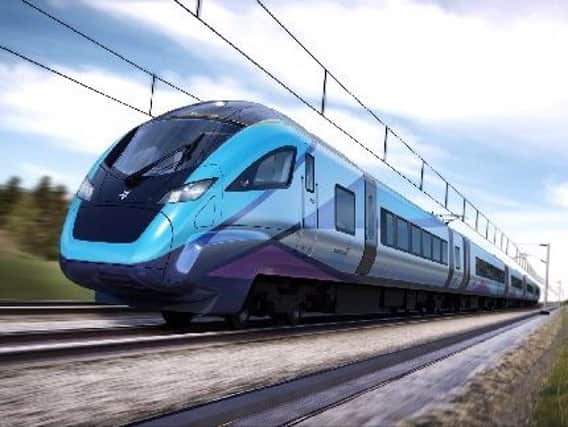Andrew Vine: Crossing the Pennines is a relic of the age of steam


That year, as the world moved unwittingly towards the horrors of the Great War, it would have taken two hours and 10 minutes for the steam-hauled train to travel from Leeds to Manchester. Now, the slowest train, like the one I was on a few days ago, zips between the two great cities in only one hour and 36 minutes.
Advertisement
Hide AdAdvertisement
Hide AdMy, doesn’t the mind boggle at the white heat of such technological progress? Only 107 years to shave about half an hour off the journey. Why, at this rate we can excitedly anticipate it only taking an hour by about the second decade of the 22nd century.
How slow the progress of speeding up some of the trains across the Pennines has been was pointed out to me by a friend who is a hardcore railway buff, after I grumbled about how long the journey had taken.
He dived enthusiastically into his piles of memorabilia – indulged by his wife on condition they remain confined to the box-room – and came up with the 1910 timetable.
I had to laugh. What else is there to do at the notion that I hadn’t been travelling much faster than a passenger passing the journey in the spring of that year by reading in his newspaper of the death of Edward VII and the succession of George V? It’s too absurd for words.
Advertisement
Hide AdAdvertisement
Hide AdThere are faster trains, doing the 43 miles between Leeds and Manchester in about 50 minutes. But even that isn’t particularly good, and the timings don’t necessarily suit people needing to get to work in either city.
They could always opt to drive instead, but like me they’ll quickly have a bellyful of the M62. If I never drive that motorway again, it would suit me just fine. The slow crawl at best, or the standstill at worst, make it one of the most frustrating routes in the country.
So the train, even the slow service that stops everywhere that I’ve taken to thinking of as the Edwardian Mystery Tour, remains the most reliable way of getting to where I need to be.
I don’t know if the Transport Secretary, Chris Grayling, is a railway buff. But whether he is or isn’t, it strikes me that a framed copy of a 1910 timetable would make a novel decoration for the wall of his office.
Advertisement
Hide AdAdvertisement
Hide AdNot only would it be a charming conversation piece, it would also serve as a silent indictment of the lack of Government action to improve trans-Pennine links, especially if juxtaposed with a framed copy of the timetable for London’s new Elizabeth Line when it is fully operational.
Passengers there won’t take an hour and 36 minutes to travel 43 miles. They’ll do 60 miles in an hour and 15 minutes. That’s more like it, and what’s good enough for people travelling to their jobs in London should be good enough for those of us travelling to work in Leeds, Manchester, Bradford, Hull, Liverpool, or any of the other places along the line linking the North’s east and west coasts.
This isn’t just an issue of fairness, a matter of demonstrating that the Government does not favour one region over another, but a question of hard-headed economics.
If London requires a fast, efficient rail link for its economy to work properly, why should the North require anything less? And, crucially, why should it be regarded as less deserving of rail links fit for the 21st century?
Advertisement
Hide AdAdvertisement
Hide AdThese are questions to which Mr Grayling appears to have no answers. Or, more accurately, questions to which he chooses to offer no answers.
That’s an important distinction. He has, as far as I know, never actually used the words “Nothing to do with me, guv,” when challenged about improving transport in the North, but that was the essence of what he wrote in The Yorkshire Post last month when he said it was the region’s own responsibility to solve problems.
With what, exactly? Even if local authorities had the means to make improvements, it is not their responsibility. The rail network is part of the national infrastructure, and should be funded by the Government, just as the Elizabeth Line was.Mr Grayling had little new to offer when he spoke about transport in Manchester last week, which doesn’t bode well for the prospects of the Government either acknowledging the unarguable case for electrifying the trans-Pennine route, let alone heeding the calls for investment from business and civic leaders.
There was something else that caught my eye about the 1910 timetable. It listed fares for the long-gone third class carriages, which carried the lowest of the low. It seems that’s how rail passengers in the North are still regarded.
Read more:
Advertisement
Hide AdAdvertisement
Hide Ad